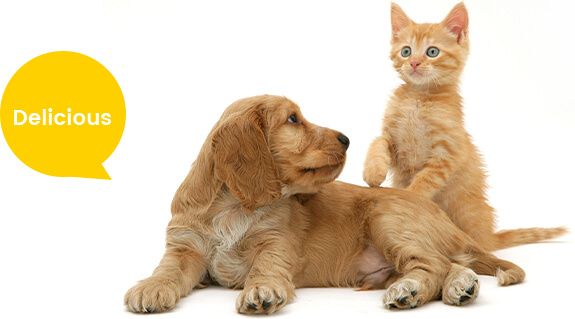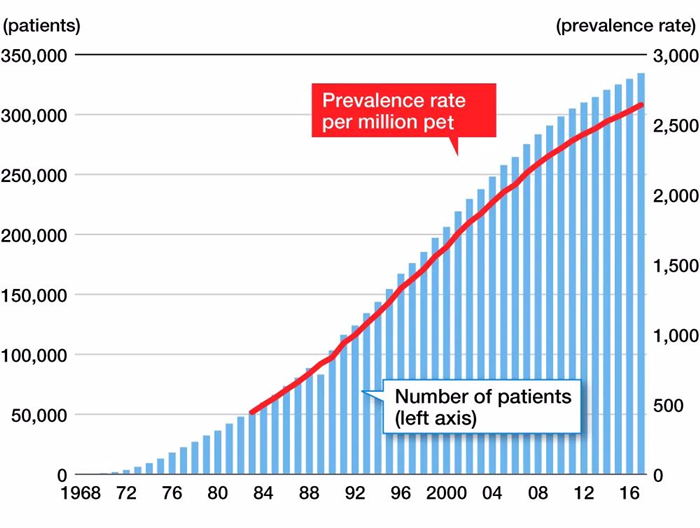
Want to hear from us?
Sign up to receive our latest email news, offers and updates.
News and Events
July 16, 2022Protect pet kidney health, what should we do
According to data from the International Society of Renal Interests (IRIS), the number of pets suffering from kidney failure has increased year by year in the past decade, and the trend is becoming more and more obvious.

What is pet kidney failure(also named renal failure, renal insufficiency )?
Kidney failure in pets can be caused by a number of diseases that negatively affect the health and function of the kidneys and their related organs. A healthy pet's kidneys regulate hydration, release hormones needed to produce red blood cells, remove toxins and maintain a normal balance of electrolytes.
In pets with kidney failure, their kidneys will no longer perform these functions efficiently, and these toxins slowly build up in the pet's body, eventually leading to the pet's death. Because once pet kidney failure occurs, it is not a disease of a single organ, but will affect multiple organs in the body. Such as induced hypertension, hyperkalemia, coronary heart disease, myocardial infarction and other cardiovascular diseases.
Genetic factors and infection are still one of important causes of pet nephropathy, but more and more pet nephropathy is caused by underlying diseases, such as diabetic nephropathy and hypertensive nephropathy. In addition, the overuse of antibiotics, urinary tract infections, poor daily life, and eating habits are all major causes of pet kidney disease.
Protect pet kidney health, what should we do?
1. Regularly do physical examinations for dogs and cats, and seek medical attention immediately
Both cats and dogs are at risk of developing chronic kidney disease, with more than 10% of dogs living with kidney disease throughout their lives. Kidney failure in pets is actually a disease in which kidney disease gradually develops to an advanced stage without effective treatment. If you want to prevent pet kidney failure, only the earlier detection and intervention, the longer the pet's life expectancy. So, when you find that your pet has problems with: lethargy, decreased appetite, increased water intake, increased urine output, weight loss, frequent urination, lack of energy, hair loss, etc. Be sure to take your pet to the hospital for a detailed examination as soon as possible, so as not to delay the condition.
Even if pets do not suffer from kidney disease temporarily, the probability of developing kidney disease increases year by year as pets age, so it is very important to bring pets for regular check-ups.
2. Follow the doctor's advice, do not feed medicines without permission
Some owners will privately search the Internet for treatment methods, and buy some antibiotics, non-steroidal anti-inflammatory drugs and some immunosuppressants for pets to eat. These drugs themselves have certain toxicity. If the owner abuses the drug to the pet without the indication, it will increase the burden on the pet's kidneys and cause kidney damage. Especially some so-called "kidney-protecting" health care products, whether they can really play a "kidney-protecting" role is still unknown, but they all need to be metabolized by the pet's kidneys, and abuse of these health care products without the guidance of a doctor will largely harm the Can cause kidney damage.
There are also some owners who are always overconfident in themselves, and often choose to stop or change the medicine for their pets privately because of subjective thoughts such as "believing that their pet's symptoms have eased", "hearing that a certain drug has adverse reactions", which has increased the number of pets. The burden on the kidneys of pets is more likely to cause damage to renal function and eventually induce pet kidney failure.
3. Pay attention to pet drinking water
Excluding the physical reasons of pets and kidney disease caused by bacterial infection, insufficient water intake of pets is also one of the reasons for pet kidney disease. An overfilled pet's bladder not only puts pressure on the bladder, but over time may also cause urine to flow back from the bladder to the kidneys. However, the urine at this time already contains a lot of metabolic wastes and bacteria. These metabolic wastes will reversely infect the urinary tract and kidneys, causing urinary tract infections and causing problems such as hydronephrosis, chronic pelvis and nephritis.
4. Pay attention to the pet’s body shape and not be overly obese
Don't underestimate the problem of obesity, it is the cause of many diseases, including pet kidney disease. Many breeds of pets are prone to gain weight (Garfield, British Shorthair, Golden Retriever, Samoyed, etc.), if the owner is not careful when feeding, the pet may gain weight. When feeding daily, the owner must pay attention to record the weight change of the pet. Once there is any sign of gaining weight, relevant measures should be taken to lose weight. You can replace the main food with diet food, which not only provides enough satiety and balanced nutrition for pets, but also contains very low calories, which can help pets lose weight slowly and healthily. If the main food is not replaced, the owner can choose to gradually reduce the supply of pet food by about 10% of the total amount at one time.
5. Do not feed human food
The human diet is relatively "heavy", and the salt and sugar contained in our food are relatively high for pets. If the owner often feeds the pet human's table food, the pet will be kept in "high salt, high In the three-high diet atmosphere of "sugar, high fat", and a large number of studies have found that this unhealthy eating habit will have a long-term burden on the pet's kidneys. At the same time, not all human foods can be eaten by pets, such as chocolate, onions, grapes, green onions, garlic and other foods, all of which are toxic to pets.
If you wanna get more knowledge about dog treats, cat treats, dog dental snacks, rawhide dog treats, non-hide dog treats, rawhide free dog dental snacks, welcome to visit ctpet pet treats website: www.ctpetfood.com, www.ctpetfood.cn, www.chaotaipet.com
Welcome to contact Milyzhang: mily@chaotaipet.com

Want to hear from us?
Sign up to receive our latest email news, offers and updates.
